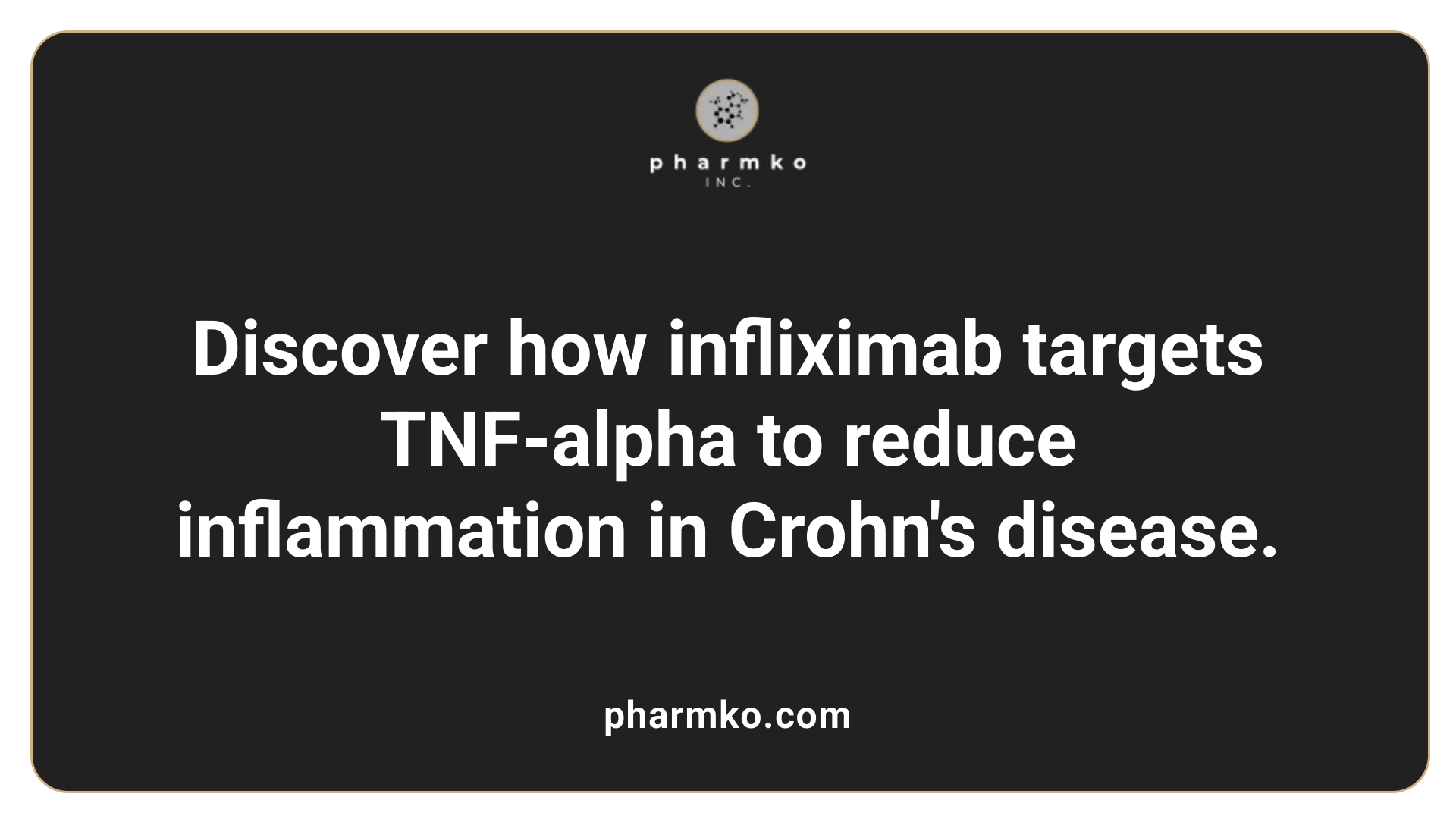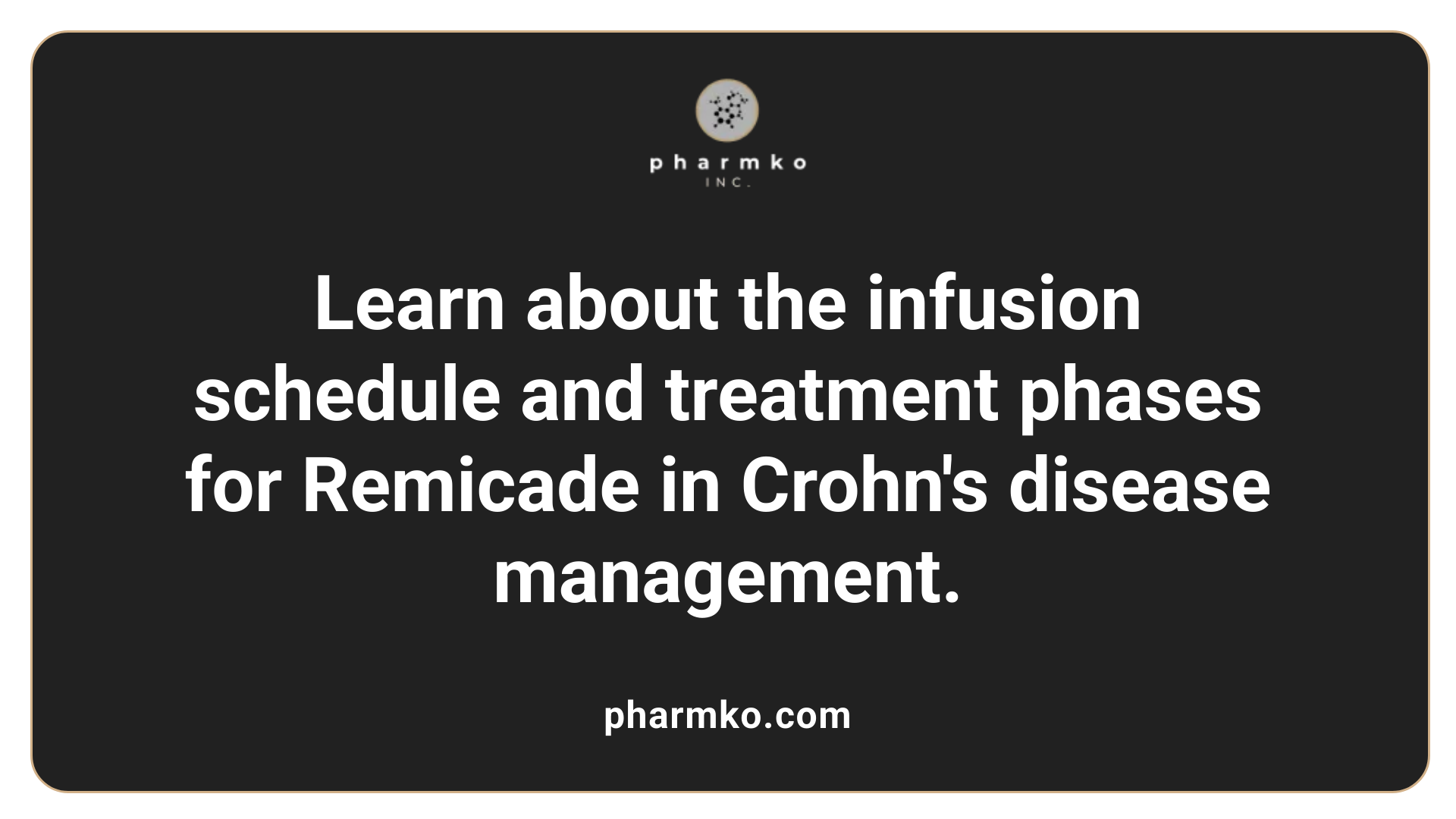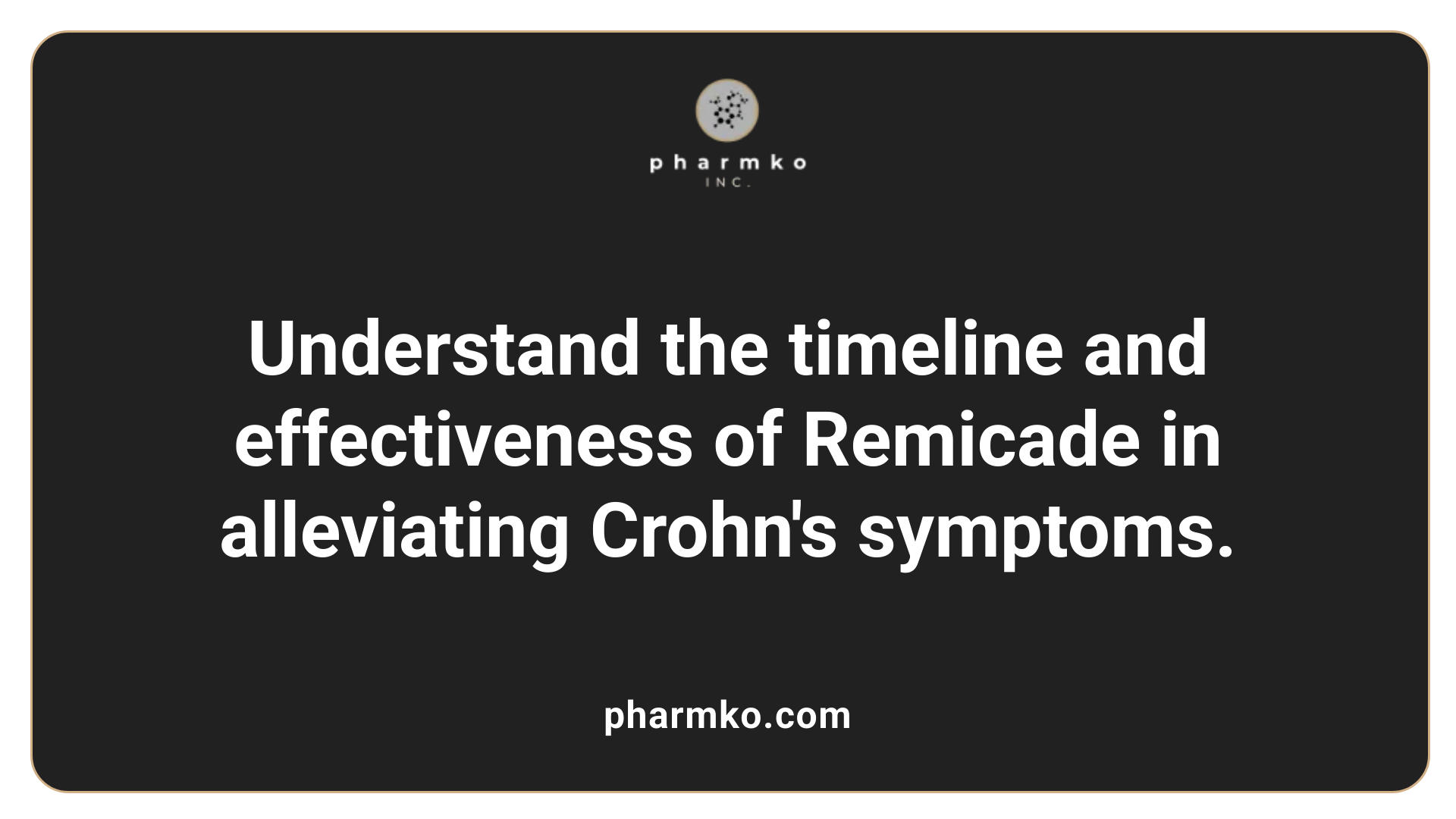Remicade therapy for Crohn’s care
Understanding Remicade: A Cornerstone in Crohn’s Care
Remicade (Infliximab) has revolutionized the management of Crohn’s disease, especially for patients with moderate to severe symptoms who do not respond to traditional therapies. As the first TNF-alpha blocker approved by the FDA in 1998, it has become a critical option in the therapeutic arsenal, providing hope for long-term disease control and improved quality of life.
What is Remicade (Infliximab) and How Does It Work?

Mechanism of action of infliximab
Infliximab, marketed as Remicade, is a biologic drug that specifically targets tumor necrosis factor-alpha (TNF-alpha). This is a protein involved in promoting inflammation within the body. By binding to TNF-alpha, infliximab prevents it from interacting with its receptors, effectively diminishing the inflammatory response.
Role of TNF-alpha in Crohn’s disease
TNF-alpha plays a significant role in the inflammatory process characteristic of Crohn’s disease. Elevated levels of TNF-alpha are found in the tissue of affected individuals, contributing to inflammation, tissue damage, and symptoms such as pain and diarrhea. This cytokine’s overproduction is a core factor in the immune system's attack on the digestive tract.
Effect of TNF blockade on inflammation
Blocking TNF-alpha with infliximab reduces inflammation by decreasing the activity of immune cells involved in the inflammatory cascade. This reduction alleviates symptoms, promotes healing of the intestinal lining, and can help achieve and sustain remission in patients with active Crohn’s disease. Many clinical studies have demonstrated that targeting TNF-alpha with infliximab effectively decreases inflammation and improves quality of life for patients who do not respond well to traditional therapies.
Administration and Treatment Protocols of Remicade

How is Remicade administered and what is the typical treatment protocol for Crohn's disease?
Remicade (infliximab) is delivered through an intravenous (IV) infusion, which typically lasts about two hours to ensure proper administration and patient safety. The infusion is performed in a healthcare setting under medical supervision.
The standard treatment protocol begins with an induction phase involving three initial infusions. The first dose is given at Week 0, followed by another at Week 2, and a third at Week 6. This schedule is designed to quickly control inflammation and reduce symptoms.
After the induction phase, patients move into the maintenance stage. During this phase, infusions are scheduled every 8 weeks. This regular dosing helps sustain remission and prevents flare-ups of Crohn's disease.
The actual dose may vary based on the patient's weight and response to therapy. If a patient responds well but later loses response, the dose may be increased to 10 mg/kg or the interval shortened.
Throughout the treatment, healthcare providers monitor patients for side effects, infusion reactions, and signs of infection or other complications. This ongoing monitoring ensures that the therapy remains safe and effective, allowing adjustments as needed.
Additional details:
| Treatment Stage | Dosing Schedule | Purpose | Duration per Infusion |
|---|---|---|---|
| Induction | Weeks 0, 2, 6 | Rapid inflammation control | At least 2 hours |
| Maintenance | Every 8 weeks | Maintain remission | Every session lasts about 2 hours |
Keywords: Remicade infusion, Crohn’s disease treatment, IV infusion schedule, disease management
Efficacy and Outcomes of Remicade in Crohn’s Disease

How long does it typically take for Remicade to start working for Crohn's disease?
Remicade (infliximab) usually begins to show effects within the first few weeks after treatment begins. Patients typically follow an induction regimen of infusions at weeks 0, 2, and 6. Clinical improvements can sometimes be seen as early as 2 to 6 weeks into treatment.
Some patients notice symptom relief during or shortly after the initial induction phase, which involves the first three infusions. However, the exact timing for observable benefits can vary based on factors like disease severity, response to the medication, and whether other treatments are being used concurrently.
Following the planned schedule and maintaining regular infusions every eight weeks are important for the ongoing effectiveness of the medication. Communication with healthcare providers about response and any side effects helps optimize treatment outcomes.
Overall, while some patients experience early improvements, others might require more time to achieve full symptom control, emphasizing the need for patience and close monitoring during the treatment process.
Safety Profile and Monitoring During Therapy

What are the common side effects and safety considerations of Remicade therapy?
Remicade (infliximab) can cause a range of side effects, from mild to severe. Patients often experience infusion reactions, which may include symptoms such as fever, chills, chest pain, blood pressure fluctuations, itching, and difficulty breathing. These reactions typically respond well to slowing the infusion rate or administering medications like antihistamines or steroids.
Common infections are also frequent, with respiratory infections, headaches, coughing, and stomach pains being among the most reported. While many side effects are mild, serious safety concerns include a heightened risk of infections, notably tuberculosis (TB) and other bacterial, fungal, or viral infections. Because of these risks, thorough pre-treatment testing for latent TB and hepatitis B is recommended.
There is also a concern about an increased likelihood of developing certain cancers, such as lymphoma. This risk is particularly relevant for pediatric patients and young adults. Other severe adverse effects include worsening of heart failure, liver injury, blood disorders like anemia or low white blood cell counts, nervous system issues, and allergic reactions.
To ensure safe use, healthcare providers typically perform comprehensive evaluations before initiating therapy. During treatment, patients require frequent monitoring for infections and signs of other side effects. Patients should be aware of symptoms like persistent fever, unexplained weight loss, or unusual bruising and report these to their doctors promptly.
In summary, while Remicade is effective in managing Crohn’s disease, its use must be carefully balanced with the potential risks. Working closely with healthcare professionals helps mitigate these risks by appropriate testing, vigilant monitoring, and timely intervention when necessary.
Patient Selection and Eligibility Criteria
What are the criteria for a patient to be eligible for Remicade therapy?
Remicade (infliximab) is primarily prescribed for patients with moderately to severely active Crohn's disease who have not responded well to other medications. Patients are considered suitable candidates if they require effective control of intestinal inflammation to reduce symptoms and prevent disease progression.
The medication is approved for adults and children aged 6 years and older, making it a viable option for pediatric patients with severe disease activity. Before starting treatment, healthcare providers carefully evaluate the patient’s medical history, including previous infections, risk of cancer, and heart conditions such as heart failure.
Testing for latent infections like tuberculosis and hepatitis B is essential, as these can become reactivated during immunosuppressive therapy. Patients with active infections or significant infection risk factors are typically not suitable candidates until these conditions are managed.
Candidates should also be assessed for their overall health status, including prior responses to therapy, presence of fistulas, and the need for IV infusion treatments administered under medical supervision.
Ultimately, the decision to initiate Remicade therapy involves balancing potential benefits with the risks of serious side effects. A healthcare professional reviews all these factors to determine if the patient is an appropriate candidate for infliximab treatment, aiming to improve symptoms, induce remission, and maintain quality of life.
Clinical Trials and Historical Context of Remicade’s Use
What are the key studies demonstrating Remicade's effectiveness?
Remicade's efficacy in treating Crohn’s disease has been extensively studied through several pivotal clinical trials. Notably, the Targan study revealed that 81% of patients treated with infliximab experienced symptomatic response by Week 10, compared to only 16% in the placebo group. The ACCENT I and SONIC trials further confirmed that patients receiving regular infusions of Remicade maintained higher remission rates and mucosal healing, with about 30% showing intestinal healing by Week 10. These studies provided solid evidence that targeted therapy with infliximab improves clinical outcomes and supports long-term disease management.
Why is Remicade historically significant?
In 1998, Remicade (inflximab) became the first monoclonal antibody approved by the FDA for the treatment of a chronic disease—Crohn's disease. This approval marked a major milestone in medicine, as it demonstrated that large, protein-based biologic therapies could be administered repeatedly with minimal immune rejection. Recognized as a pioneer in biologic treatments, Remicade helped redefine how immune-mediated inflammatory diseases are managed, showing that precise targeting of immune molecules could lead to substantial therapeutic benefits.
How has Remicade impacted treatment standards and safety monitoring?
The introduction of Remicade transformed Crohn's disease treatment into a more predictable and effective approach, emphasizing early, aggressive intervention to prevent structural damage and improve quality of life. Its widespread use prompted the development of new safety protocols, including routine testing for infections like tuberculosis and hepatitis B before starting therapy, and ongoing monitoring for adverse effects such as infections and malignancies. Moreover, the drug's long-term safety data from postmarketing surveillance and registries have informed guidelines, ensuring safer use of biologics in clinical practice.
| Study Name | Main Findings | Impact on Practice | Notes |
|---|---|---|---|
| Targan Study | 81% responded by Week 10; mucosal healing in 30% | Validated infliximab's efficacy in Crohn's | Dosed at weeks 0, 2, 6, then every 8 weeks |
| ACCENT I | Maintained remission over long-term use | Supported scheduled infusions for sustained response | Showed durability of remission |
| SONIC | Combination with immunosuppressants improved outcomes | Influenced combination therapy guidelines | Emphasized importance of early intervention |
Understanding how these studies shaped current practice underscores the importance of evidence-based use of biologic therapies like Remicade in managing Crohn’s disease.
Expanding the Role of Remicade and Future Directions

Use in fistulizing Crohn’s disease, pediatric populations, and other IBD conditions
Remicade has shown effectiveness beyond general Crohn’s disease treatment. For patients with fistulizing Crohn’s, it can help reduce draining fistulas and maintain closure, significantly improving quality of life. Pediatric patients aged 6 and older also benefit from Remicade, experiencing reductions in symptoms and achieving remission when conventional therapies fail.
In addition to Crohn’s disease, Remicade is approved for ulcerative colitis and rheumatoid arthritis, broadening its application across various inflammatory bowel diseases and autoimmune conditions. Its ability to promote mucosal healing and reduce dependence on steroids makes it a vital option in managing complex immune-mediated diseases.
Development of biosimilars and alternative biologics
Since Remicade’s initial approval in 1998, several biosimilars such as Inflectra, Avsola, Ixifi, and Renflexis have entered the market. These biosimilars offer comparable efficacy and safety profiles at potentially lower costs, increasing access for many patients. They undergo rigorous testing to ensure similarity to the original biologic while maintaining the clinical benefits.
Research continues into newer biologics, including fully human monoclonal antibodies like adalimumab, aiming to reduce immunogenicity and improve long-term tolerance. The development of these agents offers alternatives for patients who develop antibodies or lose response to infliximab.
Emerging research on combination therapy and immunogenicity
Ongoing studies focus on combination therapies, such as pairing infliximab with immunomodulators like methotrexate, which may reduce the formation of antibodies and enhance efficacy. Understanding and managing immunogenicity remains a critical area of research, as immune responses against biologics can diminish therapeutic effects over time.
Furthermore, advances in personalized medicine aim to tailor treatment based on individual immune profiles, potentially predicting response and adverse reactions. As research evolves, these strategies promise to optimize outcomes, minimize risks, and extend the benefits of infliximab in Crohn’s disease and other inflammatory conditions.
Table summarizing future directions for Remicade
| Area of Focus | Current Developments | Potential Impact |
|---|---|---|
| Use in various conditions | Approval for fistulizing Crohn’s, pediatric use | Broader patient access |
| Biosimilar development | Multiple biosimilars approved | Cost reduction, increased accessibility |
| Alternative biologics | Fully human antibodies like adalimumab | Reduced immunogenicity, longer-lasting effects |
| Combination therapy & immunogenicity | Immunomodulators to reduce antibody formation | Improved response, fewer adverse reactions |
As ongoing research continues, the landscape of infliximab treatment is likely to shift toward more personalized, effective, and accessible options for patients with Crohn’s disease and related conditions.
Optimizing Crohn's Disease Management with Biologic Therapy
Remicade has fundamentally changed the landscape of Crohn’s disease treatment, offering effective symptom control and the potential for long-term remission through targeted TNF-alpha blockade. With a well-established safety profile and clear protocols for administration and monitoring, it remains a cornerstone for patients with complex disease who need more than traditional therapies. Continued research and development, including biosimilars and personalized treatment approaches, promise to expand and refine Crohn’s disease management in the years ahead. As always, close collaboration with healthcare providers is essential to maximize benefits and minimize risks, ensuring that each patient’s journey toward better health is as safe and effective as possible.
References
- Adult: moderately to severely active Crohn's disease - Remicade
- Remicade® (infliximab): 20 years of contributions to science and ...
- INFLIXIMAB | Crohn's & Colitis Foundation
- Infusion - Monmouth Gastroenterology
- Clinical Information | REMICADE® (infliximab) HCP
- Official Consumer Website for REMICADE® (infliximab) | REMICADE®
- Procedures | Remicade Infusion Therapy
- Remicade Infusion Therapy | Norton Healthcare
- Remicade (infliximab): Side effects, dosage, cost, and more
- Crohn's disease - Diagnosis and treatment - Mayo Clinic













